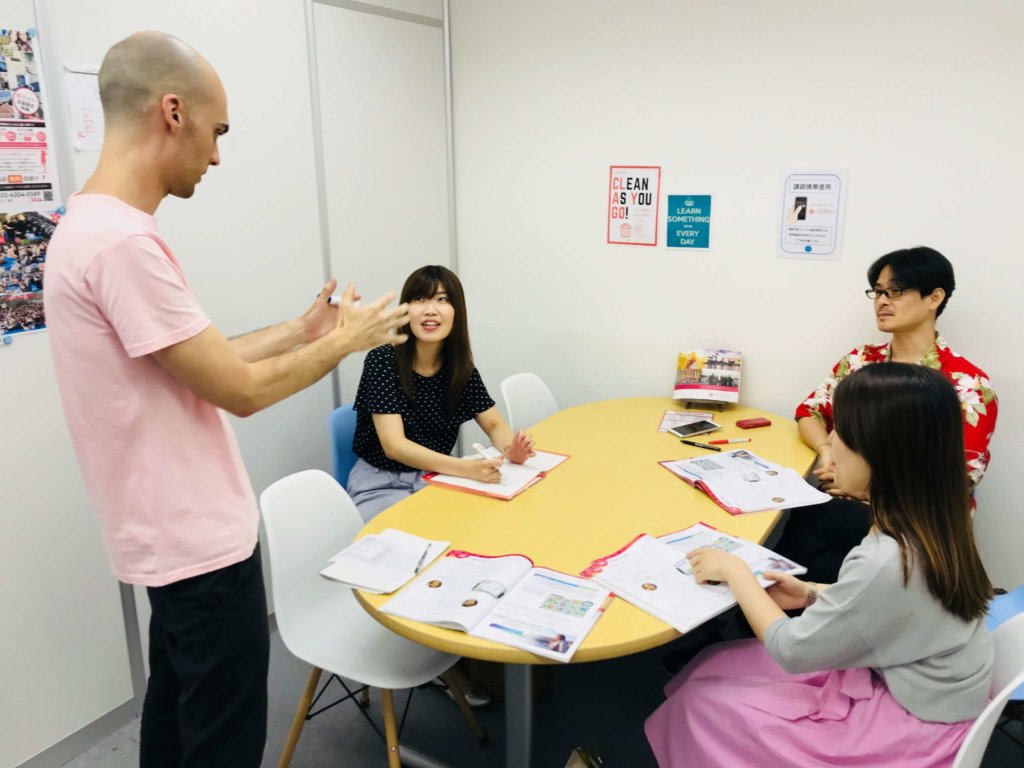Tips for Teaching English in Japan to Adults

Japan is of course famous for teaching English but did you know a big percentage of those people are teaching part-time in Tokyo? Teaching English in Japan is definitely one of the best jobs to get some money during your time as a student or if you are experiencing Japan with a Work Holiday Visa. In addition, for those who do not speak Japanese perfectly yet, you usually don't need any level of Japanese to teach English part-time in Tokyo since your lessons are all in - you guessed it - English!
Experience the culture by being part of the culture
Before getting into the teaching tips, the first tidbit we would like to give you is to take in the culture of Japan. One thing that visitors to Japan will say time and time again is that one of the best ways to get the full experience of the culture is to talk, talk, and talk with the local people. Any kind of interaction with the locals (don’t be afraid to talk to other foreigners as well though!) will help with your trip.
Sometimes the interaction will leave you with directions, and advice and sometimes it could leave you with free accommodation like this lucky teacher did (related picture below). Whatever the interaction, it is an amazing way to experience the culture and get insight into Japan that you might not get otherwise.

Another way to experience the culture while also doing the previously mentioned is actually teaching adult students! One of the benefits of teaching English in Japan to adults rather than children is being able to have actual conversations that have substance. The stories that the students will tell you about their culture without you even thinking about it will almost always give a pleasant surprise. Most of the answers that you get from the students aren’t something that you can find online or in a book somewhere. Especially because of how diverse each experience is on a daily basis. Without further ado, here are the tips on Teaching English in Japan to adults.
1. Be Yourself
One of the most important things about teaching English part-time is making great connections with students. Since the students are customers, the best way to make connections is by adding value in their lives with not only your teaching skills but also your personality. Many part-time teachers who are freelancers or work in English schools know that students become fond of teachers not only because of their skills but also because of how they interact with them on a human level.
Keeping things inclusive, relaxed, and friendly is something that we consider important for us here at One Coin English. Our passion is to create an environment where students and teachers feel part of something bigger than themselves.

If the students wanted a robot, they would have done a one-way application-based course!
Human beings love connecting with people who have values, ideas, and ways of looking at the world. Some of the teachers who worked at One Coin English were able to make lasting connections.
In my personal experience, having a part-time job in an English school where adult students have the option of choosing their teachers has taught me that many of my students are very similar to me. Don’t be afraid to be yourself with your students, it is okay to talk about your life and hobbies while also asking about theirs.
Depending on the type of organisation you join, the students will change however one thing that will stay the same is that Japanese students want to relax and enjoy. Usually, in an international atmosphere, they can be themselves in a safe space. How do you make someone feel relaxed? Well, the first step is also relaxing yourself!
2. Maximize Your Strength
One of the most important points when teaching in any job is knowing your strengths. Knowing how to market that and emphasizing why that makes you different. With the Japanese economy shifting towards a more progressive, online model, you need to be able to also adapt and improve little by little even the small things that often get unnoticed.
Diverse Styles
Working part-time in Tokyo, in a school with teachers from different backgrounds, personalities, and teaching styles has shown that it is possible to have a diverse way of teaching. Some teachers are very passionate and use a range of motion and body language techniques to teach. These teachers do very well with the switch when they can begin utilizing their strengths to the max.
Some other teachers are more chill. They are very calm, sweet and teach in a very relaxed way. The students have different ways of learning and will gravitate towards the style they prefer learning from.
3. Body Language and Expressions

Body language or use my voice? Why not both?
When you are teaching, quantify what makes you great and use it to help the students. Some teachers like myself, since I’m a very expressive person, give students feedback through facial expressions. If the student makes a mistake, I will frown, touch my chin, and make a “hmm?” sound. If they are correct, I will smile and nod. Through trial and error, I was able to see that this is the style I was comfortable teaching with and is what my students also enjoyed as they could easily understand.
Some will have a focus point during the lesson. They’d make the students talk to the other students before engaging in the day’s lesson. This usually involves the teacher making the students use English. Inadvertently boosting their confidence and getting them into the English mindset. One thing I noticed is teachers who are more chill would usually give feedback to the students indirectly. It won’t be a very clear yes or no, that is correct and that is the wrong approach. Rather, they would comment something along the lines of
“Good job for trying, you’re almost there. What about this…?”
“Almost, very very close! Try again!”
“Ooo! Good job! Let’s make it sound more natural!”
To be clear, there’s so many styles of teaching and the teaching style you have doesn’t have to be the same one a friend or colleague has. One of my favourite types of teachers to learn from are the ones that use images. They spend a lot of time finding the right images to explain their point or to really drive home their explanation. For me this is tough and I spent a considerable time trying to copy a style that really doesn’t work for me. However, I learned from that style as well as some of the teachers who using the board and activities/role playing to get the point across. One of the teachers I really admire would have the students do small presentations about something they like, that would boost their confidence in speaking English while also practicing a bit of public speaking.
As an English teacher, the possibilities and ways to deliver amazing and informative lessons that students will love are endless.
4. Be a Coach, Not a Counselor

Teaching English is more than reading a book in front of students or teaching grammar. Teaching is about coaching your adult students to become the best version of themselves by letting them do the learning. A counselor is someone who can understand and listen to your problems. Has identified your needs and as a result they can tell you exactly what you need to do to improve. Don’t get me wrong, some students learning English need a counselor. In these cases usually the company you work for will provide a service, you don’t have to do this.
What you need to do is aim to be a coach. Learning a language is an exercise and Olympic stars have coaches. Not counselors. A coach is someone who uses the information they’ve learned from you and the information you already know to guide you to solutions.
In the case of the coach, instead of telling exactly the mistake and how to fix it, guide them on how to solve it and build confidence to do so. That way they begin to learn and correct themselves. We are not the drill commanders but facilitators of English.
5. Minimize your Teacher Talking Time (aka Speaking Ratio)

Teaching English is more than just a lecture. It’s more than talking about what you like and expecting the students to know what to do. When I started my job as a part-time English teacher in Tokyo, my throat was hurting all the time. I never knew why, I mean, I’m just talking to my students but after 6hours my throat is sore. What gives? That’s when a teacher in the school I work in gave me the very important advice.
Try talking less
Simple advice. Very easy to understand but very hard to implement as a new teacher.
Coming from a Latin American background where we love to talk and express ourselves through verbal communication, this was a tough one to master. My biggest mistake was that I was looking at myself as a conductor and my students as an orchestra. If the teacher is dominating and controlling, the students will most likely take the background role. This means your student will not talk or have the desire to speak more. More often than not, this means that your students will not take your lessons again. Make sure you have some speaking gaps or cues.
Did you know that most, if not a very large percentage of the Japanese population learn English in Junior High School and in High School?
Here’s a fun video, kinda old but still rings truth Though, change is coming. It is slow!
Usually, when Japanese people learn English in Junior High School and High School, they only learn basic grammar and some vocabulary and there is little chance to speak English at all. For that reason, many Japanese people want to speak English but find it difficult due to bad teaching practices of their past.
If you talk too much when you teach, you take away the students opportunity to speak and may eventually make the student lose their confidence. The spiral only begins there as they won’t have the confidence to let you know, leading to them believing maybe they’re not cut out for learning English. Maybe even believing they were not able to communicate with the teacher.
In addition, Japanese students usually do not mention that they want to speak more but the truth is they do want to. Last but not least, it makes lessons boring and monotonous. Some strategies to reduce your TTT are:
- Use body language, gestures, and facial expressions rather than words.
- Use guiding questions and clear examples so that students can mimic you.
- Leave a gap between your sentences to allow them to digest as well as think of an answer.
- Don’t mistakenly assume that a silent period is negative and awkward. This is a lesson and not a blind date. Allow the person time to think, tell them to ask you a question, there are so many ways you could use this moment and turn it into an opportunity to speak.
6. Have Fun!

Last but not least, my last advice is for you is to have fun and enjoy teaching English. Don’t see it as a routine job but as an opportunity to be creative and bring amazing value to your students. We understand students are customers but we also recommend you to see them as friends, it is okay to say a couple jokes, to share your story and to develop strong bonds with them. The job of an adult English teacher in Tokyo is not only to teach grammar and vocabulary but to also bring joy and value to the lives of your students. Do your best and do not forget to enjoy the process of teaching.
So there you have it...
Thank you for sticking through to the end of our guide on teaching tips for part-time English teaching jobs in Tokyo! We hope it could have been of some use to you! If you happen to be in the market for a teaching job you should also check out our article on teaching jobs in Japan. It lists a number of companies and teaching jobs that are available to you and is constantly being updated!
For those that want to try other part-time jobs in Tokyo as well check out our part-time jobs in Tokyo article. There you'll find a variety of job types and companies that are hiring.
And lastly, if you are just trying to get set up with housing accommodations before you start your teaching journey in Japan, check out our sharehouses in Tokyo article. You'll be able to make use of some nice promotions and discounts on sharehouses and apartments around the city through the article.
We hope this helped and in the meantime, we hope that you can make use of some of our teaching tips!
Frequently Asked Questions
To teach adults in Japan, you typically need a bachelor's degree and, ideally, a TEFL or CELTA certification. Specific requirements may vary depending on the employer and the type of institution you work for.
However, at One Coin English, there are no specific requirements for teaching certificates.
1. Research Job Listings:
Start by exploring various job listing websites and platforms. You can visit our company's website One Coin English, where we often post job opportunities for teaching adults in Japan. Additionally, popular job search websites like GaijinPot, Jobs in Japan, Craigslist, and YOLO are excellent resources.
2. Networking:
Utilize your professional network, including former colleagues, mentors, and peers, to learn about job openings. Attend industry-related events, workshops, and conferences where you can meet potential employers or colleagues in the field.
3. Consult with Recruitment Agencies:
Some recruitment agencies specialize in placing English teachers in Japan. They can help you find suitable job opportunities and assist with the application process.
While it's not always a strict requirement, having a basic knowledge of Japanese can be helpful for communication, especially with beginners. However, many English language schools emphasize immersion teaching, so fluency in Japanese is not necessary.
Work schedules can vary, but many adult English teachers work in the evenings and on weekends, as that's when many adults have free time. Part-time and full-time positions are available.
Yes, you'll need a valid work visa to teach legally in Japan. Employers often assist with the visa application process. Tourist visas and student visas do not permit you to work.
There's a consistent demand for English teachers in Japan, especially in urban areas. Business English, conversation skills, and test preparation (e.g., TOEFL or IELTS) are in high demand.

English Teaching Part-Time Job
No Experience? No Problem
We provide training, observations, and feedback for new teachers. We will help you to become an effective teacher!





